Dana Porter Library, first floor
University of Waterloo Library
Waterloo, Ontario N2L 3G1
519-888-4567 x42619 or x42445
Russia is now the lard of vast colossal change. All life, indeed is change, and certainly now as never before, new thoughts are superseding old traditions. There have been previous great upheavals in history--sporadic periods of new thought and practice--which have generally remoulded but one area of life at a time. The Italian Renaissance profoundly affected the intellectual, artistic and cultural world about it. The Reformation stirred the Religious impulse of peoples anew and brought revised conceptions of morality, which affected all succeeding generations. The American and French Revolutions were pinnacles in the long struggle for political liberty.
The Russian Revolution embraces all these elements and vastly more! There, in the largest country of the world today--as large as the whole of North America--they have dared to cast aside not only an old established monarchy, an out-grown social system, old legal codes and the institution of private property; but are building, in the ashes, an advanced system of economic life, and a radically new form of Representative Government: they are deliberately instilling entirely new conceptions of morality, of religion, of life and liberty. They are changing the very face of the land with a myriad of new institutions. They are endeavoring even more--to actually change human nature. It is the most all-embracing, all-consuming revolution of all time; the first scientifically planned and directed revolution in history--with a well-developed, complete ideology awaiting application. It is the greatest event of modern times--the most significant thing in the world today.
It is a continuing revolution, growing, if anything, in scope and volume. I do not mean in violence and bloodshed, for the old legend that it was the bloodiest revolution in history has been dispelled. Actually it was one of the least so, and certainly comparing its magnitude to others, was one of the least violent of all major revolutions. In Leningrad the tables were turned in three days, in Moscow ten days. There was little or no destruction of property. There were no scenes comparable to the Grench [i.e. French] Guillotine. The worst of such gory spectacles as occurred in the aftermath were committed, not by the Soviets, but by the armies of reactionary White Russians, supported by foreign capital, who invaded after the revolution, and attempted to restore the old regime.
And so, when I say the revolution is today still growing in scope and volume, I mean in the extent which new standards, new values, new thoughts and new institutions are replacing the old. For good or evil it must affect the entire world and continue to affect us profoundly in the years to come.
Again, for good or evil, it has come to stay! This fact must at last be accepted. For fifteen years one Party has been in continuous power, pursuing one consistent policy. It is the only major country of the world in which that is true. Other great political powers—Germany, France, England, Canada, United States, and China, have undergone numerous changes in their ruling parties and in policies. When we look back over the last fifteen years of Russian History, and see the struggles they have been through and almost surer obstacles they have overcome, there appears little capable of dislodging them now. Here, in 1917, was a country whose administration had broken down; its political, social and religious life infected with corruption, intrigue and incapacity; whose armies ware down-hearted and defeated, a country which had just undergone two revolutions--Kerensky's of February, 1917, and the Communist Revolution of October, 1917; a country facing utter chaos, famine and the hostility of the world. A relatively small, but powerful, group of men set about a task which appeared fantastic and impossible. They faced foreign armies of invasion on every side--a French Army, a Polish Army, a British Army landing at Baku, an American Army which landed at Archangel, a Canadian army at Vladivostock. They faced bitter attacks by the White Russian forces of Denikin, Kolchak, Wrangel, Yudevitche, Petlura and Krasnov. Three years of allied economic blockade ensued, when contact with the outside world was entirely cut off. Then followed the greatest famine of Russian History in 1921-22.
It was too much; and Lenin declared his New Economic Policy in 1921. This offered concessions to foreign industrialists and seemed a retreat to Capitalism. We have learned since, however, that it was but a temporary strategic move to gain strength for a greater Socialistic drive to follow. That drive has been in full force for the last seven or eight years. There have been failures, blunders in these years, and personal tragedies written through it all; but there have also been tremendous constructive achievements, until now the most competent observers yield the present regime a longstanding, if not a permanent place.
For all these reasons--sheer physical magnitude, its large and rapidly growing population, its future place in world affairs, and trade, Russia compels our attention. But even more, the all-enveloping scope of its continuing revolution, the fundamental questions it forces to the fore in every walk of life, and the incessant infiltration of its ideas throughout this planet of ours--behooves us all to enquire searchingly of the truth, and to understand this enigma of the nations--to praise where praise is due-to criticize where that is due--but above all to understand.
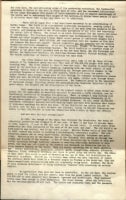 There are at least four vital conditions necessary to an understanding of Russia today. The first is an ever-present historical perspective, keeping always in view the Russia that was; separating the legacies of the past from the products of the present, and carrying with it the evolutionary perception of all life, and especially the social life of Russia. The second is an alert discernment for the source and color of information. For fourteen years our reports came predominantly from Riga, Berlin, Warsaw and other neighbouring cities, where exiled groups of embittered emigrés fed a hostile foreign press. Both critical and complimentary news now reaches us from Moscow because the doors are opened. Mailed despatches are not censored and the Soviets themselves criticize vehemently. It is still necessary, though, to decipher any bias of the reporter or the publishing Journal. The third condition is constant study of reports in the great world journals such as the New York Times, the New Statesman and Nation, the Manchester Guardian, the Christian Science Monitor, Current History, etc. The fourth condition, of course, is obviously the open mind.
There are at least four vital conditions necessary to an understanding of Russia today. The first is an ever-present historical perspective, keeping always in view the Russia that was; separating the legacies of the past from the products of the present, and carrying with it the evolutionary perception of all life, and especially the social life of Russia. The second is an alert discernment for the source and color of information. For fourteen years our reports came predominantly from Riga, Berlin, Warsaw and other neighbouring cities, where exiled groups of embittered emigrés fed a hostile foreign press. Both critical and complimentary news now reaches us from Moscow because the doors are opened. Mailed despatches are not censored and the Soviets themselves criticize vehemently. It is still necessary, though, to decipher any bias of the reporter or the publishing Journal. The third condition is constant study of reports in the great world journals such as the New York Times, the New Statesman and Nation, the Manchester Guardian, the Christian Science Monitor, Current History, etc. The fourth condition, of course, is obviously the open mind.
One often wonders how the comparatively small body of two to three million members of the Communist party can rule this land of 164,000,000 people with such increasing sway. The first answer is that it does not rule. The country is politically ruled by its multitude of Soviet Councils, beginning with the local council in each factory, office, farm or school and pyramiding up, through successive stages, to the All-Union Congress of Soviets with 1500 members, which meets every two years. The people further rule another large area of life through the consumer co-operative stores which now have 80,000,000 shareholding members; and again, another area through thousands of associations of producing co-operatives. The Communist party is the spearhead of emotional energy, directing genius and propulsion--the fanatical believers in the goals ahead, the keepers and the missionaries of the faith.
Full membership in the Party is the highest honour to which every worker aspires; but its membership is carefully selected to maintain a lofty standard, and intentionally restricted to heighten its prestige. There is always a long waiting list of prospective members. Then there are 6,000,000 Komsomals--young Communists up to twenty-three years of age-- and 9,000,000 younger pioneers. In all, about 18,000,000 confirmed, convinced, zealous converts working might and main with devotion that equals or surpasses anything the world has seen. If one Capitalist can enlist 100,000 to silently work for him, as sole dictator and autocrat, surely 18,000,000 Communists can induce another 150,000,000 to work for themselves with a voice in their own affairs.
And now what has been accomplished?
In 1920, the trough of the chaos that followed the Revolution, the total of industrial production had dropped to 20 per cent. of what it had been in pre-war days. In 1931, however, it rose to 300 per cent. of the pre-war level. In recent years total production has been increasing at the rate of 26 per cent. per year. The old world's record held by any country, was 12 per cent. a year. Maurice Hindus tells us they have, in 1932, turned the corner to becoming a predominantly industrial country. The construction amazes one on every hand--roads, railways, telegraph, telephone and power lines. Factories not by the hundred, but by the thousand, have sprung up through the length and breadth of the country. A few of these factories may be closed or only partially operating through technical reasons or awaiting additional machinery or more power, but they are not closed by the hundred and thousand, as factories now are in every western country of the world. They are mostly operating two or three shifts a day. Social institutions, hospitals, clinics, parks, playgrounds, schools, libraries, theatres, clubs, community kitchens, are there in great array and active use. The whole of this short talk could be used in describing any one of them, but descriptions are available elsewhere. Believe me, or believe many others who have reported, or recall the pictures which were shown to a thousand people in Windsor a few weeks ago, they are there--magnificent structures, and more are constantly being built. Further, the whole of this enormous development is being internally financed with relatively no outside capital.
In Agriculture they have not been so successful. In the old days, the surplus grain to feed the cities, and for export, came from the great landed estates. The 100,000,000 or more peasants were backward, ignorant and inefficient. They produced little more than enough to feed themselves. The first decree, after the revolution, was the nationalization of all land. The nobles and landlords fled, and the peasants parcelled up their holdings. Production reverted to the most inefficient type. Natural causes added to crop failures; and food has been a harassing problem. Forcible grain collections, to feed the cities, worried and embittered the peasants. Great state farms were established, the largest "Gigant" having over 1,000,000 acres. It stretches for sixty miles--all one farm. This could not provide the whole solution; and the great collective farm movement was begun as the only practical way in which the wellbeing and security of all could be ensured.
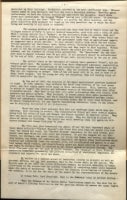 The average holding of the peasants has been from ten to twelve acres and the villages consist of fifty to several hundred households, each with such a strip of land. When a village decides for a "kolhoz", as the collective farms are called, they pull down all their fences, fill in ditches, and pool all their land. They retain their own houses, chickens and a garden patch. The government sends them an agricultural expert, an organizer and a social adviser. It also extends credits with which the now collectivized peasants buy fertilizer, seed, better cattle, building materials and machines. The group elects its own management committees and they begin to farm together. Within a year or two the collectives invariably double the yield per acre, their income increases, and the standard of living rises perceptibly. The "Pyateletka" (as the five year plan is known) intended that 22 per cent. of all peasants should be collectivized by the end of 1933. Actually there were 80 per cent. collectivized by the end of 1932.
The average holding of the peasants has been from ten to twelve acres and the villages consist of fifty to several hundred households, each with such a strip of land. When a village decides for a "kolhoz", as the collective farms are called, they pull down all their fences, fill in ditches, and pool all their land. They retain their own houses, chickens and a garden patch. The government sends them an agricultural expert, an organizer and a social adviser. It also extends credits with which the now collectivized peasants buy fertilizer, seed, better cattle, building materials and machines. The group elects its own management committees and they begin to farm together. Within a year or two the collectives invariably double the yield per acre, their income increases, and the standard of living rises perceptibly. The "Pyateletka" (as the five year plan is known) intended that 22 per cent. of all peasants should be collectivized by the end of 1933. Actually there were 80 per cent. collectivized by the end of 1932.
The Soviets stand on the threshold of winning their greatest "front", but not without great cost. The peasants, rooted from their complacent ignorance, superstition, tradition and intense individualism of the centuries have oft become bewildered at the kaleidoscopic whirlwind which engulfed them. They oft resisted, and sometimes fought. They are now beginning to accept. Some of the old never will do so, and to them it is deep, stark tragedy. But the young not only are accepting, they are bending every effort to accelerate the cause.
By the end of 1931, the solution of the major agricultural problems appeared in sight. In 1932, however, they suffered the worst crop reverses of the last seven years, and food supply again bulks large in their calculations. This, however, is not to accept or support the extreme and unfounded stories of starvation which have often circulated abroad. They have vastly more soil under cultivation than ever before, with machines and modern methods. They averaged, in recent years, more grain production than ever in Russian History, and their exports have never approached pre-war levels. There are undoubtedly local shortages in certain areas, due to local crop failures and to faulty transportation, but any reports approaching starvation terms, on any scale, can be seriously discounted if not disbelieved.
There are many other problems they face and handicaps under which they are laboring. More clothing is needed. The reconstructed Poland got their textile plants, along with the cities of Lodz and Warsaw; and Russia depended on imported cotton. They have now built new textile factories in many cities. They arc raising millions of acres of cotton in Turkestan. The people are still 'shabbily clad, but again, one witnesses advance and change from year to year.
The five year plan dramatized one phase, if not the most important phase of their whole activity--"Planned Economy"--the first five year plan has passed into history; the second has begun; but "Planned Economy" continues, as the rock bottom, permanent base upon which all else rests and advances. If you can imagine all our factories, our railways, our power stations, our mills, our farms, our stores, our wholesale houses, our banks, our exporters and importers, our myriad other institutions which directly and indirectly touch our economic life, all co-ordinated and geared to a central agency which studies, and scientifically plans all major activity in advance, you can begin to envision what is involved in the Soviet system of planned economy. The first five year plan was the work of 33,000 experts. The "Gosplan" or State Planning Commission comprises permanently the greatest collection of staticians, engineers, accountants and experts the world has known.
We believe in a maximum amount of individual liberty in economic as well as personal matters, and our laws guarantee that to the victor shall go the spoils. The Soviets came to see there was little difference between the private ownership of human lives--such as the slaves--and the private ownership of everything human lives depended upon--the means of production. This involved the complete socialization of industry and commerce, to be run for the whole of the people by the representatives of the people.
As Sidney Webb, Lord Passfield, says in the February issue of Current History -
"What the fathers of the United States Constitution aimed at, was also the object of Lenin's lifelong devotion--to use the American phrase--to secure the equal rights of all men to life, liberty and the pursuit of happiness. Jefferson thought that this would be attained if we cleared away monarchy and all hampering legal restrictions on individual effort, merely maintaining courts of justice and a police force."
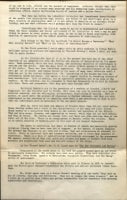 "But this was before the industrial revolution had transformed three-fourths of the people into propertyless wage earners, and before it had unwittingly given to a small minority of capitalists, what it is not unfair to describe as an economic dictatorship, and one that Jefferson would perhaps have been the first to resent."
"But this was before the industrial revolution had transformed three-fourths of the people into propertyless wage earners, and before it had unwittingly given to a small minority of capitalists, what it is not unfair to describe as an economic dictatorship, and one that Jefferson would perhaps have been the first to resent."
"Accordingly what the U.S.S.R. seeks to do--is to deliberately and continously [i.e. continuously] shape the whole economic and social environment of the population in such a way as genuinely to secure to every person in the land, so far as may be found practicable, both equality of opportunity and the widest possible expansion of individuality."
This brings to the fore the questions "Is Soviet Russia a Democracy?" "What Real Liberty Exists?" and "What is the future of individualism?"
To the first question I would again refer my radio audience to Sidney Webb's brilliant series of articles now appearing in "Current History", which I shall not take time to quote further.
As for liberty--the lack of it up to the present has been one of the chief concerns of all sympathizers with the Soviets and sources of denunciation by its opponents. Most certainly there has been tyranny; and conscious sacrifice of individuals to society and the future. Some who have tried to escape without passports have been shot at the border. There has been individual oppression. The collectivization of the peasants got out of bounds and became forced in the hands of many local officials until a stop was put by the central authorities. The liquidation of the kulaks has been unnecessarily harsh and hasty. But again, I would suggest caution in accepting stories of mass barbarities. Life is orderly, and no oppressive practices are to be seen on the surface. On the contrary, one is astounded to find how frequently he is told by individuals here, there and everywhere, that they have more freedom now:
Certainly Russia's aim is the provision of a maximum of freedom, liberty and happiness; but she believes just as firmly, that these can only be provided on a base of material security, and the well-oiled, co-operative, functioning of society. That requires, at least until the process of education is further advanced, and they are more experienced in the practice of it--possibly even until a new generation is born to it-that all individuals must be harnessed to the one great purpose.
Even so, there are many new spheres of freedom where they did not exist before. Every factory worker has a voice in the administration of his shop and local Soviet. Every member of a collective farm shares in the control and operation of the Kolholz. They now have money, freedom, and opportunity to travel, which they did not have before, and they do travel. The trains are always full; and there are jobs awaiting them at the other end of the line. There is no unemployment in Russia; rather the reverse. There is an actual scarcity of workers--even in this year of our deepest depression.
The press is controlled, but there is freedom of speech and measurably greater religious liberty than we have been led to suppose. As for speech, if anyone imagines the present day Russians do not talk and critize [i.e. criticize], they are entertaining an ethereal illusion. There is incessant talk and vehement criticism, and it finds many channels of expression. There is a wave of self-criticism deliberately encouraged by the government. The papers, controlled as they are, print, not columns, but pages of letters from both peasants and proletariat from near and far-off corners of the Union.
As for "Forced Labor", Mr. C. M. Lloyd says in "The New Statesman and Nation" -
"Compulsion in Ale crude sense of the word has played little part in the drive to accelerate production. The methods have been more subtle. They have consisted of-Propaganda, Croup Pride, Appeals to Patriotism, Socialist Competition, and The Recognition of Achievement.
The British Timbermen's Commission which went to Siberia in 1931 to investigate the Forced Labor charges--exonerated the Soviets and advised continued timber dealings.
Mr. Lloyd again sums up a Soviet Council meeting with the words "They have an air of liberty, equality and fraternity. They are no longer the lower classes." And so I could go on quoting many others and giving innumerable similar anecdotes from personal experiences and observation.
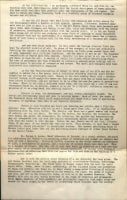 As for individualism, I am profoundly convinced there is, and will be, infinitely more real individualism, based upon the varied development of human personality than could ever have been possible under any continuance of the old regime. One sees it before him today, flowering forth in a bountiful array of released energies, talents and abilities.
As for individualism, I am profoundly convinced there is, and will be, infinitely more real individualism, based upon the varied development of human personality than could ever have been possible under any continuance of the old regime. One sees it before him today, flowering forth in a bountiful array of released energies, talents and abilities.
It was the old Russia that held little individualism and little chance for its development--where a hundred million squalid, ignorant, illiterate, backward peasants were as like as peas in a pod. It is the New Russia where those same peasants and their deaf, dark villages, are taking on new life, color and diversity, with the influx of education, entertainment and contact with the outside world. It is the new Russia where young and old alike are studying in every field of learning to equip themselves for creative work and the performance of a thousand special tasks--where the quickened pulse of life issues a clarion call for the daily shouldering of a thousand new responsibilities.
And now what about morality? In this realm the foreign observer finds perhaps the greatest surprise of all. In place of the cesspool of crime and promiscuity featuring the reports on which he has been nurtured, he finds crime abated below that of many supposedly more civilized countries. And why should it not be so? The flagrant inequalities of wealth have been removed. Security has been given to all who will work and there is work for all. A variety of social insurances remove demoralizing fears. The idea of punishment has been discarded as ultimately accomplishing nothing, and is yielding place to policies of redemption and reform. But above all--energies have been redirected into constructive channels!
As for the "Nationalization of Women" in which some of our kith and kin delighted to wallow for a few years, such a ridiculous absurdity scarcely needs further dispelling for any intelligent mind. Russia is the last country where such a featherbrained fantasy could apply--for women are free and equal with men as women have not been before in history, and are unlikely to be in other nations for years or generations to come. There is not only a wholesome moral tone, but one would say a lack of sex consciousness which we, in America, exposed as we are to a blatant, continuous abnormal expression of it on every hand, can scarcely conceive.
Divorce is easy, but discouraged, and well within reasonable bounds. The movies are refreshingly clean and jazz is scarcely known. Back of this, the ranks of the Communist Party and their youth organizations are swept with a type of puritanism, stronger, if anything, than that of our Plymouth forebears.
Russia is also building her broad and towering new edifice upon a firm educational base. Education with her is not a thing apart from life. It is inextricably interwoven with the whole fabric. The schools, and there are a great number and variety of schools, are but one phase. The radio, the movies, the theatre, the nurseries, the rest homes, the parks, the newspapers, the libraries, the parades and demonstrations, are all integrated into one vast and complex educational system covering the span of life from the cradle to ripe old age. Before the war, Russia was 33 per cent. literate. Today 70 per cent. of her people can read and write. This advance, in less than a single generation, stands pre-eminent in educational history. Her central publishing house in Moscow issues more books than all the publishing houses combined of either Great Britain or the United States.
Dr. George H. Locke, Chief Librarian of Toronto, in a recent address, declared his admiration for Russia's all-pervading method of education and wished our schools had more of such a character. Frederick Griffin discerns in the Soviet schools an awareness of life, a seriousness of purpose, and a maturity of outlook which ours have not. This is a subject in itself. For now, let it rest that there is education on a vast and complex scale, of an advanced and scientific nature--permeated, of course, with Communist doctrine--but an education that fits its pupils for life and aids in the building of a better social order.
And so with the arts--a broad stimulus of a new character has been given. The old Russia bestowed upon the world many geniuses of creativeness--Tolstoy, Dostoevsky, Rachmaninoff, Tchaikovsky. The State Opera in Moscow ranked with the best the world could offer. Today, there is less, undoubtedly, of the finished beauty and perfection of these old masters; but there is, in their stead, a many-sided flowering of artistic expression. Drama and music flourish in the schools, the clubs, the parks of culture and rest, and out on the collective farms, as well as in the crowded theatres. The graphic arts are, as yet, mainly harnessed to the cause of education and propaganda. Every shade, however, of both aesthetic and utilitarian ingenuity find ample scope and demand for their output in the shower of lithography which descends upon the country. Architecture takes on daring and striking new lines in its attempt to portray and express the new values in life. Useless ornamentation declines, while the structural members, architecturally analogous to the proletarian who does the work, stand out in bold and recognized relief.
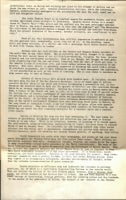 The State Theatre Trust is in constant search for aesthetic talent, and will quickly sky-rocket young prodigies to prominence. Maurice Hindus writes in a recent issue of "Vanity Fair"--"The artist and the engineer are the most privileged individuals in Russia, the artist sometimes more so even than the engineer" and "the Revolution has cultivated in the Russian masses a hunger for intellectual and artistic diversions, which the present resources of the country, however extensive, are insufficient to satisfy."
The State Theatre Trust is in constant search for aesthetic talent, and will quickly sky-rocket young prodigies to prominence. Maurice Hindus writes in a recent issue of "Vanity Fair"--"The artist and the engineer are the most privileged individuals in Russia, the artist sometimes more so even than the engineer" and "the Revolution has cultivated in the Russian masses a hunger for intellectual and artistic diversions, which the present resources of the country, however extensive, are insufficient to satisfy."
Much of all this multitudinous new, artistic expression is mediocre as yet; but new geniuses will, undoubtedly, arise from out of it. In the meantime, opera, music and drama continue, of a calibre and with a patronage which enable Moscow still to walk with Vienna, Paris or London.
Perhaps more has been written on the threats and dangers Russia presents to the world than on any other theme. She is currently and widely thought to be undermining the most sacred bases of our civilization--morality, religion, the home, private property and our red-blooded initiative. Some of us, though, had thought we were gradually progressing from the raw red blood, inherited from the days of tooth and claw, to the sweeter bloods of civilized life; and would rather welcome any acceleration to the process. Even more, Russia is generally suspected of flooding the world with a stream of insidious propaganda, and to have numberless agents at work throughout the underworld, if not penetrating as well to the seats of learning. She is also known to maintain an army second only to that of France.
Several of these issues have already been touched upon. In religion, science has been made the God of the New Russia's devotion. It is at least open to serious question whether there is any great gap between worshipping a personified God, or worshipping the manifold laws he made and the myriads of material and life creations through which he so largely expresses himself. Casting the church aside in Russia means not, to them, a denial of the finest and best in life, as it would mean to many of us--but rather the casting over of another instrument of oppression--handmaid of an incapable oppressive government; and a caricature of that which the proletarian carpenter of Nazarene gave to the world. So far from the most basic religious characteristics disappearing, many of the world's profoundest thinkers have seen unfolding these years in Russia, in the very bosom of communism itself, a new and inspiring religion, afire with dynamic meaning and reality. They have found it embracing many elements of Christianity, and which may yet prove the most cleansing catalytic for a decadent world and a crystallized church.
Russia is altering the home but far from destroying it. The same human instincts of parenthood, monogamous loyalty and affection run just as deep in Russian bosoms as in any other. There is no intention, however, of allowing it to become again, the self-centred, property-conscious, unstimulating to itself, divisive force in society which it has so largely been. Its interests are now turning outward into wider social circles; but the family unit is maintained, strengthened and guarded with various protective measures, until its security has already become greater, if anything, than before.
World Communists are astir with their propaganda, and events of the last three years throughout the Western World have far from cooled their ardor. Their official organization supports them well. Communistic thought, however, has become quite the vogue in many respectable circles quite untouched by the Third International. The work of the Third International must be quite dissociated from the Government of Soviet Russia. They are distinct and separate entities and Soviet Russia would be just as impotent to stop this world missionary movement as is any other government. It is world-wide, world-controlled, and world supported. Russians do not even dominate its council. Many international communists have a growing distaste, in fact, for recent Russian policy, since they regard it as displaying a retrograde, national pre-occupancy of thought, rather than the orthodox internationalism of purer communism.
Russia maintains an efficient army and instructs her citizens in military practices, all of which is a justifiably disconcerting feature to the outside world. When one reviews the history of the last fifteen years, however, from a Russian viewpoint, one little wonders at her nervous fear of attack. She has been exposed to a constant barrage of threatening, foreign gestures, from the invading armies and the blockade, to the murder of her ambassador in Poland; the seizure of her interest in the Chinese Eastern Railway; the raids on her trading agencies throughout the world; non-recognition by many powers; refusals to trade; incessant misrepresentation; and, during the last year, the disturbingly dangerous manoeuvres of Japan. Through all of this she has displayed a restraint which has led students of world politics and League Officials at last to absolve her of war-like intentions. She has done more. She was the readiest of the nations to sign the Briand-Kellog Pact. She has concluded non-aggression treaties with her neighbours. She has allowed Roumania [i.e. Romania] to keep the seized province of Bessarabia. And to climax all this, she has twice plead with the nations at Geneva for total, immediate, abolition of armaments. In 1929 she stood alone. In 1932 she was joined by Turkey. Russia knows that in war it is the workers who suffer most; and Russia is now a workers' country. It must also be remembered that they were the Socialists of the world—Macdonald in England, Liebernecht in Germany and Jaures in France, who made the most valiant attempts to forestall the last great carnage.
 In concluding let me quote Leonid Krassin--one of the ablest Soviet economic administrators of the early days. "The first phases of a new social and economic order, just because it is new, are always inferior to the last stages of an older order, even though in the end the new may prove superior."
In concluding let me quote Leonid Krassin--one of the ablest Soviet economic administrators of the early days. "The first phases of a new social and economic order, just because it is new, are always inferior to the last stages of an older order, even though in the end the new may prove superior."
And so in Russia, the early years following the revolution were certainly harder, more rigorous, more painful, than possibly any that had gone before. They have now rounded a corner to the great constructive stage. Life to the mass of the Russians holds already, infinitely more of opportunity, of security, of joy, of stimulating interest, than their previously pent-up lives could dimly have conceived. And they are just beginning. Viewing both history and the present scene, there appear vistas of development ahead which stagger the imagination. There has been terror and there have been deplorable happenings--but Frederick Griffin sums up all the terrors of Stalin as chaff in the balance compared to the long dreary years of the terrors of Czarism. One cannot but feel that the vastly greater good is now being accomplished.
Have we anything to fear from Russia? From distortions, yes; but little from the truth. We have more to fear at home from repressive practices, and the withholding of needed social and economic changes too dangerously close to the breaking point.
- H. Spencer Clark ‑
Guild of All Arts
Scarborough, Ontario.





